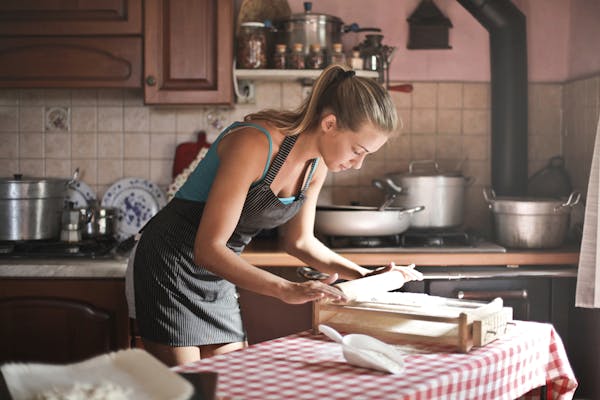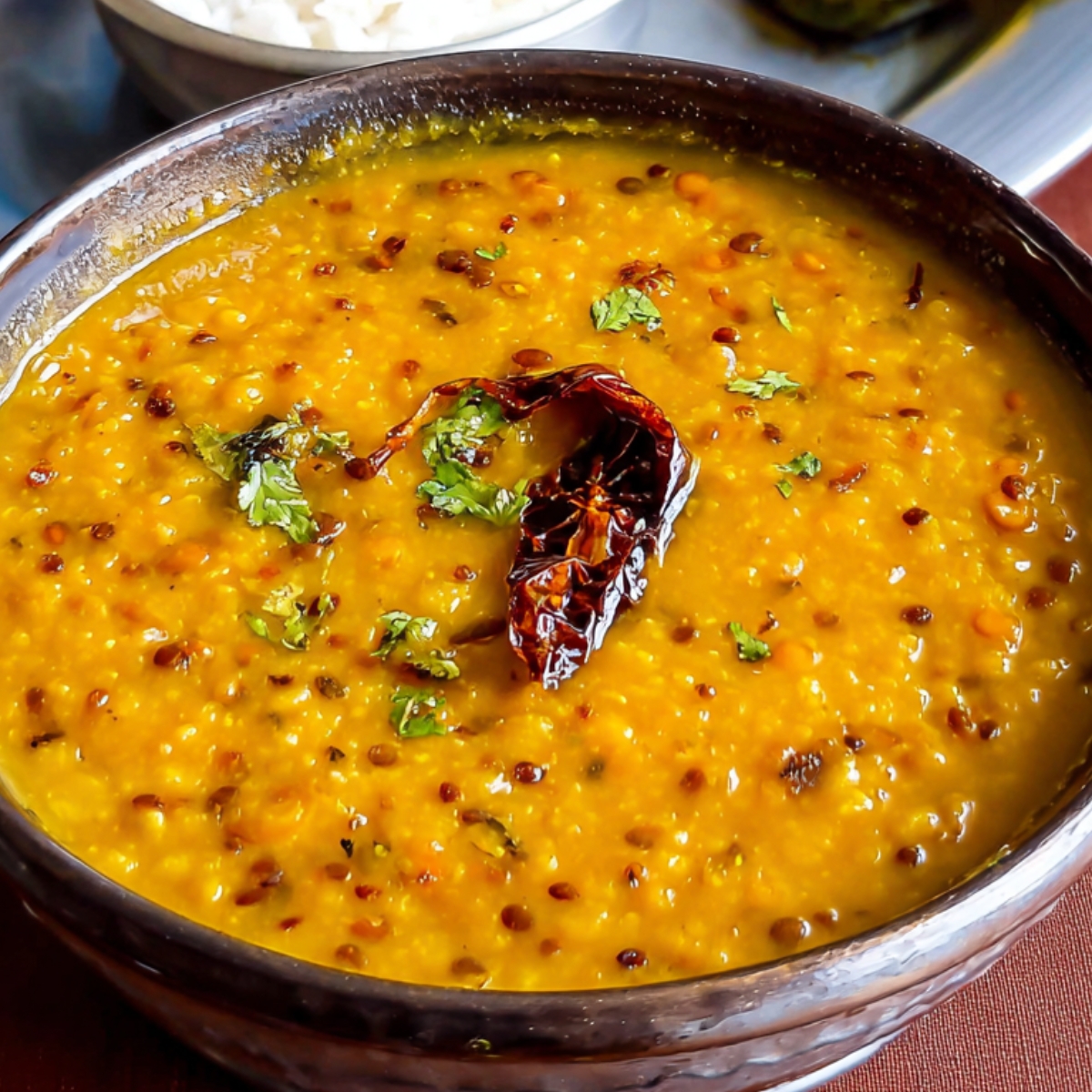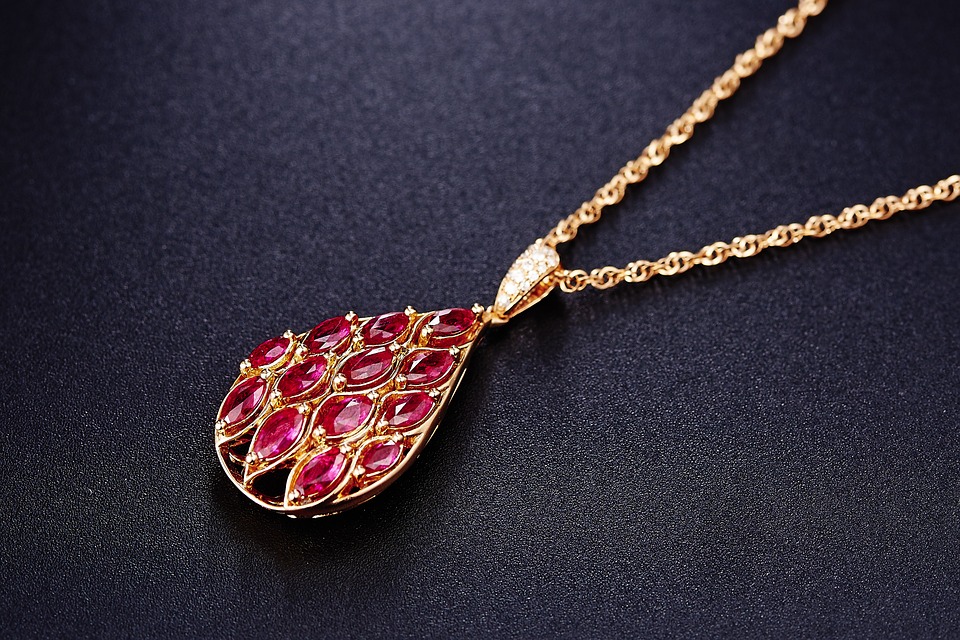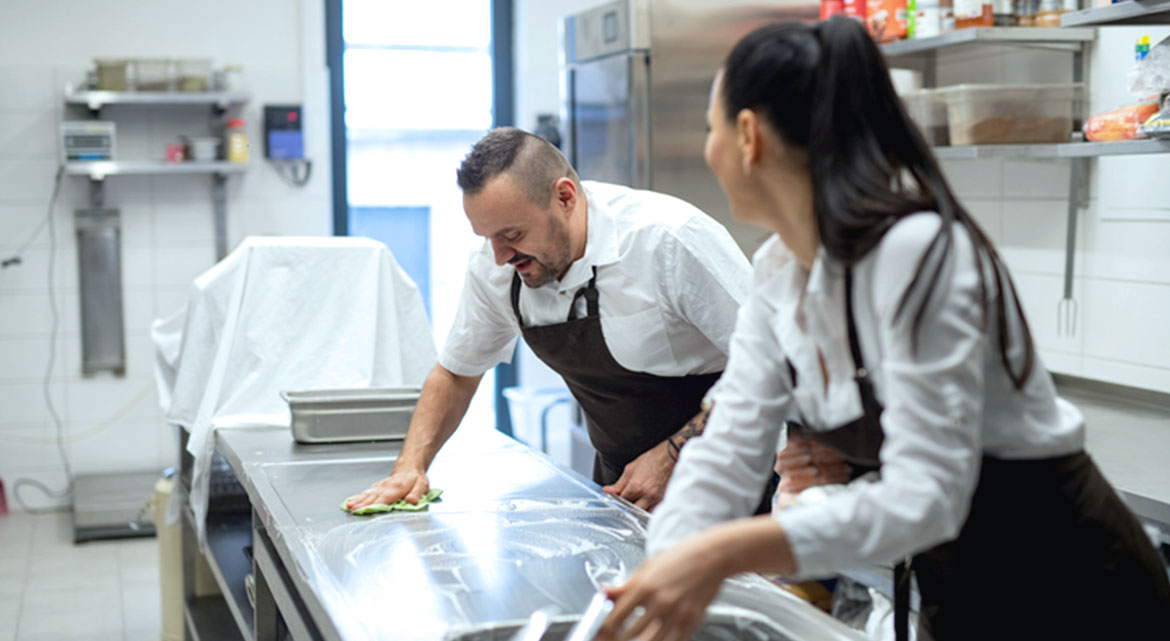Alton Brown reveals why he left Food Network for Netflix’s new Iron Chef series
Sun’s out, fun’s out! EW’s 2022 Summer Preview has dozens of exclusive looks at the most anticipated TV shows, movies, books, and music of entertainment’s hottest season. Continue to visit ew.com throughout the week for more previews of what you’ll be watching, reading, and listening to in the months to come.
Years before he was host of Food Network‘s version of the show, Alton Brown remembers the first time he saw Iron Chef on a Japanese television station in San Francisco.
“They didn’t even have subtitles or dubbing or anything and I was like, ‘What in God’s name am I watching?!'” Brown recalls of marveling at the series, which he refers to as the “granddaddy” and “pinnacle of professional culinary competition shows.”
After spending two decades at Food Network on various iterations of the show — not to mention his own Good Eats and another competition, Cutthroat Kitchen — he’s left the cable juggernaut to be part of Netflix’s reimagining of the series, Iron Chef: Quest for an Iron Legend, which debuts June 15.
Here, Brown reveals whether it was a difficult decision to leave his TV home of 20 years, what he loves about this new iteration that’s never been done on the show before, how having a cohost for the first time is better “than I ever was by myself,” and recounts his not-so-pleasant memory from his first-ever Iron Chef series.

GREG GAYNE/NETFLIX Alton Brown on Netflix’s ‘Iron Chef: Quest for an Iron Legend’
ENTERTAINMENT WEEKLY: The short teaser that was already released revealed just you, Chef Kristen Kish, and Mark Dacascos as being part of this new Netflix series, but maybe fans and viewers haven’t fully grasped your whole story, which is that with Iron Chef now at Netflix, you have said an official goodbye to Food Network. Or, is “goodbye” the word you choose to use? What are you calling it?
ALTON BROWN: You know what? I don’t think goodbye. Goodbye is really final. Perhaps au revoir or adieu for now. I don’t really think of myself as having left a place as much as I simply crossed the street to join one of my first loves. I had 20 pretty spectacular years at Food Network. I built a brand there. I became part of Iron Chef America there. But to be honest, if Netflix had taken a shot at Iron Chef without me, that would have broken my heart. [Laughs] So I had to follow that franchise, which has been such a big part of my life and a really big part of my career. And as it evolves into something new and spectacular, I just had to be a part of it.
So it sounds like the decision came fairly easily.
Yes. No. Yes. [Laughs] As soon as I knew the people that were involved — which involves two people that I’ve had long and very fruitful relationships with and a network that I’m a huge fan of and a huge watcher of — then there was really very little decision for me to make. I simply knew that if Netflix was going to have a go at rebooting Iron Chef — and they have in a magnificent way — if I was going to be invited to the party, I was going to the party, and there was nothing that would have kept me from doing that. It is such an incredibly vital franchise to me. I’ve learned through many, many years of doing hundreds of episodes of that show, to have a chance of being part of this new reimagining which is amazingly brilliant, it’s just not something that I could not do. So no, it was a very easy decision.
And since you are officially no longer with Food Network, does that mean Good Eats is no longer, or is there a new iteration that we should perhaps be on the lookout for there?
Well, Good Eats is me. Good Eats is my DNA. The actual program Good Eats has reached its end, and that’s fine. I am not saying that I won’t make another show that is a continuation of Good Eats — and who knows where that might be. Might be on Netflix. You never know. I am not done making that kind of program, but it won’t be in that original package anymore, it won’t be in the Good Eats half hour format anymore.
The saying is a saying for a great reason: If it ain’t broke, don’t fix it. In terms of the competition format of this show, it doesn’t seem like there was much broken with Iron Chef America as we were seeing it on Food Network, and having watched the first episode of this new iteration, it is very similar. What will be different in this imagining, if anything?
One of my prerequisites for being involved in this program was, one, that I would be able to evolve in my participation, and that the concept would be able to evolve — which it always has in all of its iterations. Is there a lot that is the same? Well, I don’t think there was ever anything broken, but there’s always room for reimagining and improvement, and I think what we get with this version of Iron Chef — which is absolutely my favorite — is that, number one, there are other story arcs that are taking place. Because of the wonderful nature of Netflix programming, we’re able to actually carry over story pieces over long arts, which is really impossible to do in the old style of cable broadcast and cable programming. Every one of these stories is its own arc, its own enclosed world, but there’s also an overarching arc to the entire series that I think really propels the story in an incredibly compelling way.
The other thing is that I think that we have now turned another light, another spotlight, not only the food, which has really always been my specialty — I’m there to talk about, this is happening to this onion and this is happening to this leg of lamb — but what we’ve never really had the ability to do is to really get into more personal stories of the people that are cooking the food. And that is something that, as soon as I found out was going to be a real emphasis in the show, I was extremely interested. And that is where Kristen Kish, my cohost, very much comes in because as a restaurant chef, she’s really there to help communicate those stories, which is an added dimension that we really never had time to get into before. And on Food Network, quite frankly, it just wasn’t part of the mission. Now it really is. So the people that are cooking the food — the cultures from which they come, their backgrounds — are really a whole ‘nother part of weaving into this tapestry of what food can do. So I’m there still in my original job of, this is what is happening, this is what I’m seeing, here’s what that ingredient is, this is what it’s doing. And then Kristen is there to really add that that human part of the story, which makes this a much deeper dive than we have ever been able to do before.

PATRICK WYMORE/NETFLIX ‘Iron Chef: Quest for an Iron Legend’ cohosts Alton Brown and Chef Kristen Kish
I’m glad you brought up Kristen because she was my next question. She’s a Top Chef alum, she has hosted various food shows as well — this chef really knows her way around ingredients and dish composition. She’s just a fantastic talent. Was this your first time meeting her? What were your immediate impressions?
Yes, it was my first time. I knew who she was. I mean, I get around — I don’t live under a rock. I have to say that I’ve always kind of worked alone, I’ve always been kind of a lone wolf that way and I was like, okay, I completely get why she’s there, I don’t know how I feel about it. And then I met her and five minutes later, we were completely a new unit. An absolute delight. I adore her. I think she would say the same about me. We are better together than I ever was by myself, and that takes a lot for me to say. [Laughs] She brings a huge amount to the party. She’s a great conversationalist, and you know what’s interesting, she’s a really great listener, and I don’t mean listening to me — although she’s nice enough to do that. But she really knows how to listen to chefs down on the floor and extract things from them that are really meaningful for the overall story. So I could not be happier with that relationship. I’m pretty crazy about her and I’m really crazy about how we work together, and I think that what the audience is going to get from this is that any anyone who’s ever been an Iron Chef fan is going to realize, Oh my gosh, there are real human beings doing this, there are real human beings making this food, and this is a very human enterprise that’s going on here. I think Kristen really brings that to life. I’m really crazy about her. The greatest surprise and pleasure of working on this this project was most certainly Chef Kish.
You didn’t always get to taste the challenging chef’s offerings on previous versions of Iron Chef, but here, you and Chef Kish are seated at the table with the judges to taste what the Iron Chefs and competitors are offering.
During the main run of, what, 300-and-something episodes of Iron Chef America, the only time I got to taste food is if one of the chefs sent something to me, which did happen every now and then. Now, on the Next Iron Chef series and some of the other iterations of that show, I did taste the food because in some cases, I was qualifying people to move on. But it was decided for this version of Iron Chef that Kristen and I are at the table and we do take the food. We don’t steer the judging in any way, fashion, or form, but we’re there to bring full circle but we have seen during the challenges into the conversation. And I am very grateful for that because it used to be, I did my battle and boom, that’s it, I went away. Now I get to see things all the way through and I think that has really made the conversations at the judging table richer. It’s made my waistline just a little bit bigger, but, you know, I can work that.

PATRICK WYMORE/NETFLIX ‘Iron Chef: Quest for an Iron Legend’ cohosts Alton Brown and Chef Kristen Kish
If I was in your shoes, I would want to be tasting the food. So there’s there’s that little added bonus.
I used to not want to taste the food. I used to want to just talk about what I saw and talk about what I knew and that was fine in the old show, in Iron Chef America, to not cross that line. But now, because the nature of the show is a lot more conversational and having Kristen there — she and I can look at each other like, “hey, did you just hear that?” or “hey, I didn’t think it was gonna happen.” If I was just by myself there, I don’t know that it would serve as much of a purpose except to just drive conversation. But now it’s really part of the story, which I think makes the kind of final quarter of the of the show a lot richer.
Iron Chef would not be Iron Chef without the chairman, and Mark Dacascos is back. What a lovely reunion that must have been for the two of you.
Mark is a dear friend. He is an amazing colleague to work with, a fabulous actor, and it absolutely brought tears to my eyes when I came on set and looked across that very large Kitchen Stadium — ’cause it’s very, very big — and saw him standing there and realized that he has lost all of his hair too.
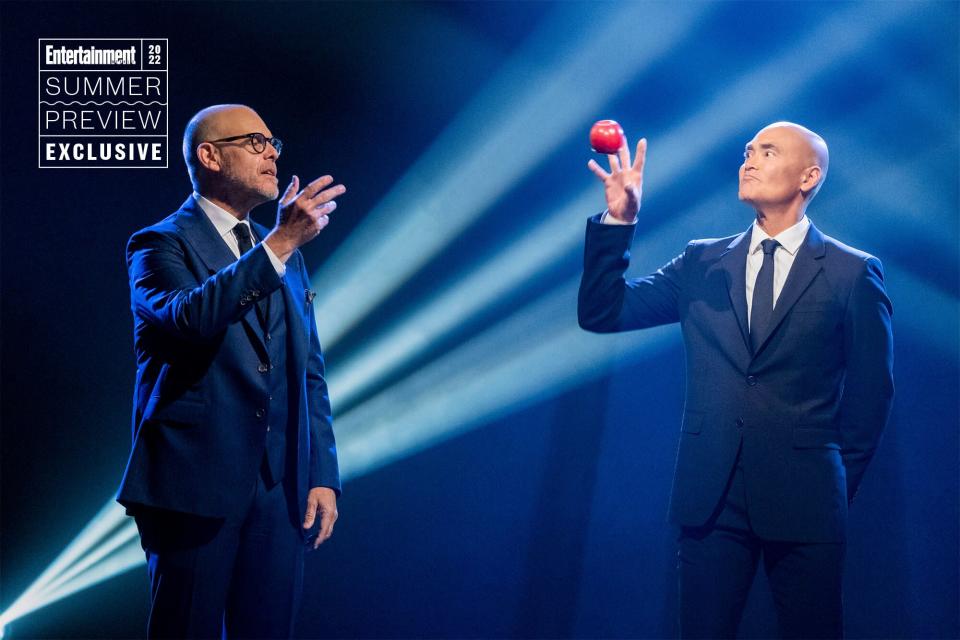
ADAM ROSE/NETFLIX ‘Iron Chef: Quest for an Iron Legend’ cohost Alton Brown and the chairman, Mark Damascos
[Laughs] Not where I thought that answer was going. You mentioned Kitchen Stadium, which is just beautiful and really sets the tone for the magnitude of this. And visually, it’s a real indication of how this has been reimagined. What’s it like walking onto that set?
It’s everything. A couple of us on the show have worked on a lot of these, and we all felt this is like “wow, we’re finally where it deserves to be.” It is a massive set, it is highly functional as the kitchen, and what’s really great about that is that cameras can get to the places they really need to get to show people and tell the stories of what’s going on with the food, which was always a challenge before because we were always working in a relatively small space with limited lighting and now, wherever the story is, we can go there and we can go there with multiple cameras and the right amount of lighting. Finally, Iron Chef has a home as big as it is.
The Iron Chefs will be revealed in coming weeks, but having watched the first episode, I will say that it is a stellar bunch of chefs and these folks are, of course, already great at what they do. But I have to assume that title, Iron Chef, brings some weight with it. So I’m curious, in conversations that I will presume you had with them, what did any of them convey to you about what it means to them to be an Iron Chef and perhaps any pressure that accompanies that?
Well, without giving anything away that might tip a hat towards identities, I will simply recall what one of the chefs said to me that kind of summed up all of the conversations that I had, which is that this is the only one that matters. This is the only one that matters. So no matter how many stars a chef gets, no matter how many restaurants, this still means something and that is important. And you know what? It shows, it shows in their performance. These are people that don’t need to sweat anymore. These are people that have proven themselves over and over. They’ve got shelves full of awards, they’ve got books, they’ve got restaurants. But let me tell you something, in that place, I saw a lot of sweat. I saw a lot of worry. I saw a lot of pushing. No one is coasting. It is an uphill battle in there all the way and every single one of them took it seriously, and for every one of them it actually means something. And you know what? You see people fall down, you see people lose, and you see people get really upset about that. [Laughs] So it matters. That’s the one thing that really came across. I know or I’ve encountered most of these people off and on in my career and and I’ve seen most of them cook and I’ve eaten most of their food and I’m telling you, this is different.
You started with Iron Chef America, which was way back in 2004. It was a series of specials called “Battle of the Masters,” with Chefs Sakai and Morimoto, who were battling Bobby Flay, Wolfgang Puck, and Mario Batali. What do you remember about most about your very early time with Iron Chef?
Well, the biggest thing that I remember from “Battle of the Masters” is that, back then, I did taste the food. And I got into a dish that Iron Chef Sakai made that included — unbeknownst to me — an ingredient that I was allergic to (an intolerance to oysters which plagued me for about 15 years but luckily has disappeared) and I ended up in hospital next to the last day of shooting. [Laughs] So that’s my biggest memory of Battle of the Masters, being in the hospital. But I think that what I knew then, at the end of that albeit short run, was that this just an amazing forum for chefs who are, by their very nature, incredibly competitive people to do their thing. And it’s funny, all the food was great, everything was great, but of course, having the Iron Chef Sakai and Iron Chef Morimoto there to provide that kind of cultural cross pollination from the original DNA of the show — which is huge, and of course we had Morimoto throughout the Iron Chef America run and always one of the most amazing chefs to watch cook — [was incredible].
This interview has been edited and condensed for length and clarity.
Sign up for Entertainment Weekly’s free daily newsletter to get breaking TV news, exclusive first looks, recaps, reviews, interviews with your favorite stars, and more.
Related content:


